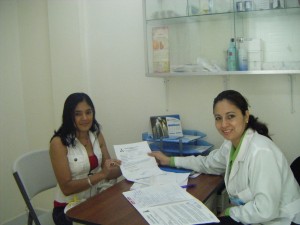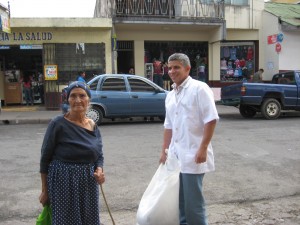Archive for News
21
Feb 2012
Los médicos de Clinica Fara
posted in: NewsBy Shermakaye Bass, Fundacion Fara
Clinica Fara es afortunado tener un personal muy experimentado y dedicado. Somos complacidos para compartir esta información en nuestro personal médico!
Director de la Clínica: Dr. Nelson Antonio Lugo, DM, MSP
El Dr.Lugo tiene una rica formación y amplia experiencia en salud comunitaria tanto a nivel nacional como internacional. Ha trabajado en regiones remotas de Nicaragua, entre ellas Waspam en la Región Autónoma del Atlántico Norte y fue beneficiario por el programa Europubhealth de una beca para cursar un máster en Salud Pública en varias prestigiosas universidades y escuelas europeas: Escuela Andaluza de Salud Pública, Universidad Jaguiellónica de Cracovia y la Escuela de Altos Estudios en Salud Pública en Rennes, Francia. A partir de esta formación, se integró a la organización Médicos sin Fronteras para desempeñar misiones humanitarias en países africanos como Marruecos y Níger.
Con una perspecitve de salud pública, el Dr. Lugo dirige la clínica con un enfoque médico y social, asegurando que las mujeres del campo que se encuentran bajo alto riesgo de cáncer cervical reciban los servicios requeridos en la clínica.
Responsable de Programa: Dra. Oneyda Chavarría, DM, Uroginecóloga
La Dra. Oneyda Chavarría tiene más 15 años de experiencia como proveedora de salud tanto a nivel comunitario como hospitalario en diferentes  regiones de Nicaragua. Ella es especialista en ginecología y recibió su especialidad en urología en México. En el 2006, ella fue la coordinadora junto con el Ministerio de Salud y la ONG internacional Médicos del Mundo para la creación del Servicio de prevención y tratamiento del cáncer cervical en el Hospital de San Carlos en Rio San Juan. Antes de trabajar en la Clínica Fara, se desempeñó como jefa del servicio de Ginecología en el Hospital de San Carlos y en el Hospital Regional de Matagalpa.
regiones de Nicaragua. Ella es especialista en ginecología y recibió su especialidad en urología en México. En el 2006, ella fue la coordinadora junto con el Ministerio de Salud y la ONG internacional Médicos del Mundo para la creación del Servicio de prevención y tratamiento del cáncer cervical en el Hospital de San Carlos en Rio San Juan. Antes de trabajar en la Clínica Fara, se desempeñó como jefa del servicio de Ginecología en el Hospital de San Carlos y en el Hospital Regional de Matagalpa.
Ella tiene un talento y especial carisma para atender a las mujeres con problemas ginecológicos.
Responsable del Servicio de Medicina General: Dra. Ruth Rocha Zeledón, MD, Diabetóloga
La Dra. Rocha tiene más de 5 años de experiencia como proveedora de salud, especialmente en las áreas rurales de Matagalpa. Del 2008 al 2009, trabajó como médico junto a las Hermanas Franciscanas de la Encarnación atendiendo a pobres y desempeñando labores humanitarias.
Su llegada a Clínica Fara en noviembre del 2010 fue debido a su deseo de proveer calidez humana y atención médica a gente pobre. Además, ella colabora con la brigada médica de cirugía de venas del Dr. Reeder y da seguimiento a estos pacientes.
En enero del 2012, la Dra. Rocha culminó un Diplomado en Diabetes en el Hospital Antonio Lenin Fonseca, motivada porque muchos pacientes padecen de esta enfermedad y no pueden acceder a un especialista.
Responsable del Servicio de Odontología: Dra. Ondina Valeria Dinarte, Dentista
La Dra. Dinarte tiene más de 10 años de experiencia como dentista. Ella ha trabajado como voluntaria para las Aldeas Infantiles SOS y en diferentes zonas rurales del departamento de Matagalpa, San Ramón y Esquipulas. Ella llega a la Clínica Fara con una fuerte experiencia en salud comunitaria para brindar servicios dentales a la población en general. Ella también da charlas a niños que viven en condiciones de pobreza sobre higiene y cuidado dental en coordinación con la ONG internacional Infancia sin Fronteras.
###
no comments21
Dec 2011

Our first college scholarship, from the San Francisco school
posted in: NewsWe are thrilled to announce that our first college scholar — the inaugural recipient of what we hope will be many, many more — will graduate university at the end of 2012. She attended the San Francisco public school in Matagalpa, one of the facilities that we support in this coffee-growing region of Nicaragua.
Stay tuned in February of 2012 for an interview with our proud young scholar!
no comments13
Dec 2011

Dr Steven Reeder, Reeder Vein Institute
posted in: NewsIn November of 2011, Fundacion Fara and Clinica Fara had the honor of hosting Texas vein specialist Dr. Steven Reeder for a weeklong mission to Matagalpa. During that time, Dr. Reeder and his five-person team treated more than 120 patients in our clinic virtually for free. These patients suffer from severe varicose vein disorders of the lower legs, often exacerbated by poor diet or lifestyle and simple lack of healthcare. Which is why such medical exchanges have become a big part of Fara’s assistance programming.
A pioneering vascular surgeon who trained at the University of Saigon in Vietnam and later in Gothenberg, Sweden, Dr. Reeder has traveled to Matagalpa twice before under the auspices of Fara and Austin Samaritans. He is based in Dallas, where he operates the renowned Reeder Vein Institute, treating scores of patients each year, using the latest laser technology to open or “drain” blocked veins. If the same problem occurs to someone in a country like Nicaragua, and they receive no medical attention, ulceration can occur, possibly resulting in amputation or, in rare instances, even death.
“The first time we went to Nicaragua, in 2010, we did the procedures in a local doctor’s home clinic, and we did about 30 cases that week. If you do 30 cases a month in the United States, that’s a lot,” Dr. Reeder says. “The second time, we worked at the regional hospital and did about 80. But we had a waiting list of 250 people.” (In fact, we are happy to note that many of those same people received care during this most recent mission.)
Dr. Reeder said Clinica Fara‘s new, modern facilities and staff made the recent trip his most effective so far in Matagalpa. Just imagine: One week of work changed 120 lives. Those whom we couldn’t treat with laser treatment or foam injection, we sent home with medical-quality hose and other compression devices, which Dr. Reeder had donated by the pharmaceutical companies CircAid and SIGVARIS.
Still, the need continues to be so great that we invited the Dallas specialist back in April of 2012. We are grateful to report that he has agreed. And — perhaps good news comes in pairs: During Dr. Reeder’s November mission, his colleague Dr. Nick Morrison, a vascular surgeon from Phoenix, made a one-day exploratory visit to our clinic, and he has since informed us that he also will travel to Clinica Fara for a weeklong mission — in June <or July?> of 2012. We would like to thank both surgeons for their commitment to the people of Matagalpa.
Often, the phrase “varicose veins” makes us think of “unsightly” spider veins. But as Dr. Reeder explains, for those who suffer from venous disease, they are far more than a cosmetic concern. Common in poor, hard-working rural areas around the world, the disorder develops as superficial veins in the lower legs swell from long hours of standing.
“Most of the people who suffer from this have ulcers on their ankles and lower legs, and a lot of them are disabled,” Dr. Reeder says. “To be disabled in Nicaragua is to go hungry. One man told me, ‘It’s getting harder and harder to work, and if I don’t work, I don’t eat. My family doesn’t eat.” Literally the next day, they don’t eat. … This is debilitating, and everyone’s (medical) impression is that it’s more common in Hispanics. And since in the really poor areas they get no treatment, it just gets worse. It’s more prevalent in Nicaragua than you can imagine, and seemingly more severe and more prevalent in the Hispanic population in general.”
One of the problems, Dr. Reeder says, is lack of access to preventative or early-onset treatment.
“In Matagalpa, they have little or no access to medical support hose, so the problem only gets worse and worse. And there is nobody that does what I do full-time in Nicaragua, because of the poverty. You can have an old-fashioned vein stripping procedure, but it’s $600. The people I’m working with, they don’t make that in a single year,” he says.
For that reason, doctors like Steven Reeder and Nick Morrison have committed their time, their staffs and their expertise to helping as many people as possible during our weeklong collaborations. And we thank them again for their dedication.
“There are so many heart-breaking stories that you just have to be consigned to helping one person at a time,” Dr. Reeder says, admitting that he is deeply moved every time he visits the Matagalpa area. “You can’t save the world, but you can help one person at a time.”
Or 120 people in one week. During the next mission, in April, we hope to help even more.
no comments





